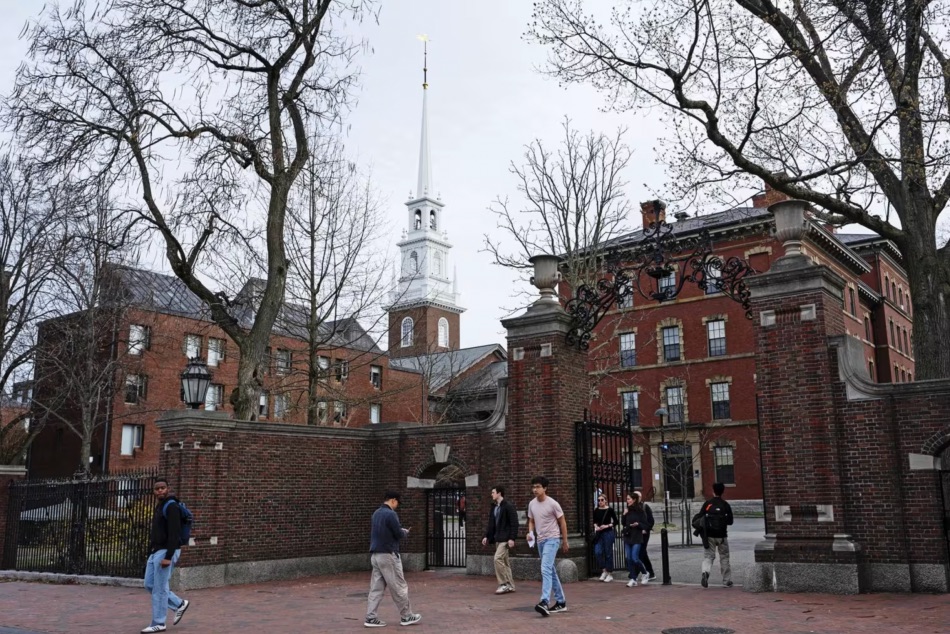CAMBRIDGE, USA — A federal judge on Friday, May 23, 2025 temporarily blocked the Trump administration’s effort to revoke Harvard University’s authorisation to enrol international students, allowing thousands of foreign-born students to remain on campus while the legal battle unfolds.
The ruling, issued by U.S. District Judge Allison D. Burroughs, came a day after the Department of Homeland Security (DHS) abruptly terminated Harvard’s certification under the Student and Exchange Visitor Programme.
The move not only barred the university from admitting new international students but also required current ones to transfer institutions or risk losing their legal status in the United States.
Harvard responded swiftly by filing suit in federal court, arguing that the government’s action was a retaliatory violation of its constitutional rights.
The university contended that the attempt to dismantle its international student programme undermined academic freedom and institutional autonomy.
“With the stroke of a pen, the government has sought to erase a quarter of Harvard’s student body, international students who contribute significantly to the University and its mission,” the complaint stated.
Under Judge Burroughs’s order, the status quo is preserved for now. International students enrolled at Harvard may remain on campus, at least until a hearing scheduled for next week.
The lawsuit names DHS Secretary Kristi Noem, Secretary of State Marco Rubio, and Attorney General Pam Bondi as defendants.
In its filing, Harvard claimed the administration’s move was “clear retaliation for Harvard exercising its First Amendment right to control Harvard’s governance, curriculum and the ‘ideology’ of its faculty and students.”
A spokesperson for the Department of Homeland Security, Tricia McLaughlin, defended the administration’s actions, calling the lawsuit an effort to obstruct executive authority.
“It is a privilege, not a right, for universities to enrol foreign students and benefit from their higher tuition payments to help pad their multibillion-dollar endowments,” McLaughlin said in a statement.
“The Trump administration is committed to restoring common sense to our student visa system; no lawsuit, this or any other, is going to change that.”
White House spokesperson Abigail Jackson also weighed in, rebuking Harvard’s leadership for what she characterised as misplaced priorities.
“Harvard should spend their time and resources on creating a safe campus environment,” she said.
“If only Harvard cared this much about ending the scourge of anti-American, anti-Semitic, pro-terrorist agitators on their campus, they wouldn’t be in this situation to begin with.”
Neither the State Department nor the Justice Department responded to requests for comment on Friday.
The legal challenge marks the second time in recent weeks that Harvard has sued the administration.
The university previously filed suit to recover over $2 billion in federal research funding revoked after it declined to comply with demands from the administration’s Task Force to Combat Anti-Semitism.
Those demands included government oversight of admissions and hiring decisions, and mandatory audits of faculty ideology — conditions the university refused.
“We condemn this unlawful and unwarranted action,” Harvard President Alan M. Garber said in a message to the university community on Friday.
“It imperils the futures of thousands of students and scholars across Harvard and serves as a warning to countless others at colleges and universities throughout the country who have come to America to pursue their education and fulfil their dreams.”
The editorial board of The Harvard Crimson published a strongly worded op-ed criticising the administration’s approach: “In his ongoing feud with Harvard, Trump has decided that Harvard’s 6,000 international students are acceptable collateral damage. They studied at America’s most storied institution. Through no fault of their own, they may leave with nothing.”
The case is expected to have implications beyond Harvard, as institutions nationwide await the outcome of what may become a landmark legal confrontation over the rights of universities and the role of the federal government in regulating higher education.







![Honouring a Rare Soul: Celebrating the Life of AVM Terry Omatsola Okorodudu [MUST READ] Air Vice Marshal Terry Omatsola Okorodudu](https://www.thetrentonline.com/wp-content/uploads/2026/01/Joan-and-Bidemi-Okorodudu-The-Trent-100x70.jpg)